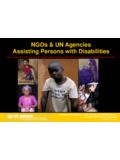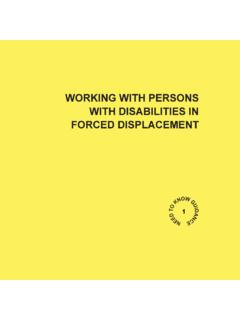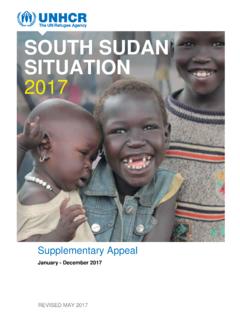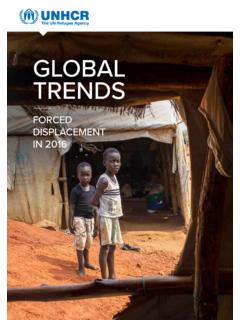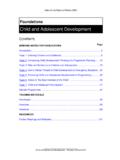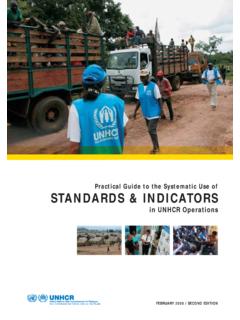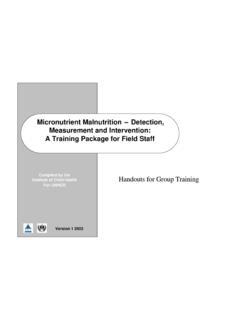Transcription of COMMENTARY ON THE REFUGEE CONVENTION …
1 COMMENTARY ON THE REFUGEE CONVENTION . 1951. ARTICLES 2-11, 13-37. Published by the division of international protection of the United Nations High Commissioner for Refugees 1997. FOREWORD. The late Professor Atle Grahl-Madsen was above all a pre-eminent international lawyer. During the eighteen months he spent as a Special Consultant in the Office of the High Commissioner for Refugees in 1962-63, he also proved to be a completely independent researcher. His COMMENTARY was unequivocally his, the result of his own findings and his own reasoning.
2 Professor Grahl-Madsen insisted on approaching REFUGEE issues from a legal perspective. He believed that the discussion of the social and political dimensions of REFUGEE flows while important, could not conclude the debate and would rarely lead to consistent and principled solutions. He always considered that the law was a beacon in that darkness, and preferred to give priority to legal analysis. Written in the early sixties, that crucial time for REFUGEE law when the 1951 CONVENTION had been in existence for just a few years, and had not yet been complemented by the 1967 Protocol, Grahl-Madsen's COMMENTARY has not, surprisingly, become obsolete.
3 On the contrary, it continues to provide valuable insights into the preparatory work of the 1951 CONVENTION and the circumstances surrounding its elaboration and opening for signature. These insights, and Grahl- Madsen's principled legal approach, can be particularly useful in today's climate, where some contracting states are increasingly interpreting the REFUGEE definition in more, some would even say unduly, restrictive ways. Grahl-Madsen's work, which has been out of print for many years, helps us to see REFUGEE law in its proper historical perspective and to identify its essential continuity.
4 And it reminds us above all of a very important common sense, as well as legal, principle, namely, what has been signed and ratified must be respected in good faith. Dennis Mc Namara Director of international protection Office of the United Nations High Commisioner for Refugees Geneva, October 1997. ARTICLE 2. GENERAL OBLIGATIONS(1). (2) (3) (4). Every REFUGEE has duties to the country in which he finds himself, which require in (5) (6) (7). particular that he conform to its laws and regulations as well as to measures taken (8). for the maintenance of public order.
5 Comments (1) No provisions similar to the one contained in Article 2 are found in earlier arrangements and conventions relating to the status of refugees. The Secretariat of the United Nations proposed in its preliminary draft CONVENTION , which was submitted to the Ad Hoc Committee, an article 10 to read as follows: "Refugees (and stateless persons) authorized to reside in a country must conform to the laws in force.". The Secretariat commented on this provision in the following words: "This paragraph constitutes a reminder of the essential duties common to nationals as well as to foreigners in a general.
6 ". The proposed article was subjected to a number of amendments until it was given its final b form at the second session of the Ad Hoc Committee. (2) The term " REFUGEE " as used in Article 2 is in accordance with the definition contained in Article 1. That is to say, that every REFUGEE who is benefitting under the terms of the CONVENTION is also subject to the provisions of Article 2. (3) Article 2 partly states only the obvious, namely that a REFUGEE , like any other person, must obey the laws and regulations in force in the country where he is.
7 The Ad Hoc Committee "fully appreciated that the provision [contained in Article 2] was axiomatic and need not be explicitly stated. However, it was considered useful to include such a provision in order to produce a more balanced document as well as for its c psychological effect on refugees and on countries considering admitting refugees. At the Conference of Plenipotentiaries the view was expressed, that the Article "constituted, not a formal and positive rule providing for punishment of offenders, but rather a moral d rule". Article 2 in fact only lays down an imperfect obligation.
8 It does not provide any sanctions in the case of a REFUGEE who does not fulfil his duties. He will not forfeit his status as a REFUGEE , and he will not - by virtue of the present Article - forfeit any of the rights and benefits which the CONVENTION confers on refugees. The Article does not prejudice sanctions which may be applied by virtue of other Articles, e Articles 26, 32 and 33. It is noteworthy that the Conference of Plenipotentiaries turned down proposals to the effects that a REFUGEE who was guilty of a grave dereliction of duty and who constitutes a danger to the internal or external security of the country, might be declared to have forfeited f the fights pertaining to the status of refugees as defined in the CONVENTION .
9 The REFUGEE who violates laws or regulations may be subjected to penalties of the same footing as other persons in the territory, provided there is no rule exempting refugees from penalties, Article 31 (1). Vattel said: "Being .. subject to the laws, foreigners who violate them should be punished accordingly. The purpose of penalties is to enforce respect for the laws and to maintain g public order and security (l'ordre & la s ret ).". a UN Doc. , b UN Doc. , c (E/1618), pp. 40-41. d , p. 23, statement by Egyptian delegate. e Cf. Statements in , p.
10 4; A/CONF. 2 , p. 21. f Cf. ; ; , pp. 18-24; , pp. 4-12; , p. 19. g Vattel, vol. III, p. 145; cf. vol. I, p. 330. (4) Article 2 only speaks of the "country in which [the REFUGEE ] finds himself". Underlying this phrase is apparently the old notion of "territorial allegiance", cf. 6. However, the phrase should not be interpreted too narrowly. A REFUGEE may certainly also have duties towards other countries than that where he is physically present; towards the country where he is "lawfully staying", even if he is temporarily absent from that country.

